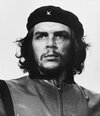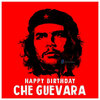
Che Guevara was born on this day in 1928. He was an Argentine Marxist revolutionary, physician, author, guerrilla leader, and diplomat. He played a key role in the Cuban Revolution, serving as one of Fidel Castro's top lieutenants

That's how we imagine che
View attachment 243507
Che Guevara was born on this day in 1928. He was an Argentine Marxist revolutionary, physician, author, guerrilla leader, and diplomat. He played a key role in the Cuban Revolution, serving as one of Fidel Castro's top lieutenants

Happy birth day to you tooI am lucky! Because I have birthday on the same date as of CHE Guevara

